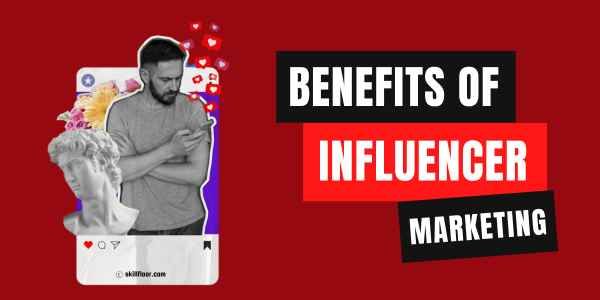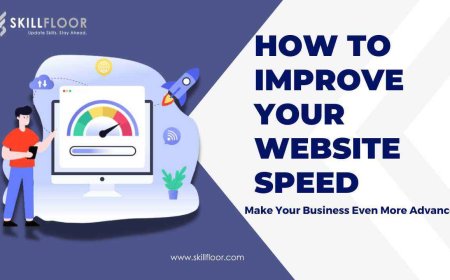Benefits of Influencer Marketing
The benefits and challenges of influencer marketing. Learn how to effectively measure success and enhance brand awareness through strategic partnerships.

As a digital marketing expert, I’ve noticed how marketing strategies have changed over the years. While traditional advertising still works, it often doesn't perform as well in today’s digital world. One popular method now is influencer marketing. This approach uses the trust that influencers have built with their followers, helping brands connect with potential customers more authentically. With social media growing, influencers play a big role in influencing what people buy.
Challenges of Influencer Selection
Despite the benefits of influencer marketing, some brands remain unsure about its effectiveness. Many wonder if influencer partnerships are worth the investment, especially in niche markets like B2B. Others may doubt the authenticity of influencers or their ability to connect with their audience meaningfully. Furthermore, Getting around the vast number of influencers and determining which ones align with your brand can be overcome. Clients often express concerns about measuring the return on investment (ROI) for influencer campaigns.
How can brands use influencer marketing to enhance awareness and loyalty?
1. Increased Brand Awareness
One of the biggest benefits of influencer marketing is that it helps increase brand awareness. When influencers promote your products or services, they introduce your brand to their followers. This exposure can be especially valuable for smaller brands trying to stand out in a crowded market.
For example, I worked with a startup that was struggling to gain visibility. By partnering with micro-influencers in their industry, we reached a targeted audience, resulting in a noticeable increase in website traffic and social media engagement. Research indicates that brands can earn an average of $5.78 for every dollar spent on influencer marketing, highlighting the potential for significant returns.
2. Building Trust and Credibility
Influencers have established trust with their followers. When they endorse a product, it holds more weight than a standard advertisement. This authenticity fosters credibility, making followers more likely to consider a purchase.
In my experience, I’ve seen brands succeed after collaborating with influencers whose values align with their own. For instance, a health and wellness brand I consulted for partnered with fitness influencers who genuinely believed in their products. This collaboration resulted in a surge of positive reviews and increased customer trust, as followers felt they were receiving honest recommendations.
3. Access to Targeted Audiences
Influencers often cater to specific niches, allowing brands to target their ideal customers more effectively. By selecting influencers whose followers align with your target demographic, you can ensure your message reaches the right people. Additionally, using eSim technology can enhance the flexibility and connectivity of influencer campaigns, enabling seamless digital engagement and communication.
In one project, I helped a tech company identify and engage with influencers in the B2B space. By focusing on thought leaders in technology, we tapped into a highly relevant audience. This strategic targeting led to increased engagement and a higher conversion rate for their software solutions.
4. Enhanced Engagement Rates
Engagement is a critical metric in digital marketing, and influencer marketing often outperforms traditional advertising. Influencers typically enjoy higher engagement rates because their content resonates with their followers on a personal level.
During a campaign I managed for a fashion brand, we noticed that posts featuring influencer collaborations received significantly more likes, shares, and comments than standard promotional posts. This kind of engagement not only boosts brand visibility but also helps create a sense of community around your brand.
5. Creative Content Generation
Working with influencers often results in fresh and creative content that you might not have considered. Influencers understand what their audience enjoys, presenting your products in engaging ways.
For example, I collaborated with an influencer for a travel company. Instead of a typical promotional post, the influencer shared a visually stunning travel diary featuring the brand’s products. This approach not only generated excitement but also created authentic content that the brand could repurpose across its marketing channels.
6. Cost-Effectiveness
Many people think influencer marketing is only for brands with large budgets. However, this isn’t true. There are influencers at every price point, including micro-influencers who offer great value for money.
In my experience, I’ve seen smaller brands achieve impressive results with micro-influencers, who often have higher engagement rates than more famous influencers. A local beauty brand I worked with utilized a group of micro-influencers to promote their products, leading to a successful campaign that generated high returns at a lower cost than traditional advertising.
7. Improved SEO and Online Presence
Influencer marketing can significantly enhance your brand's online presence and search engine optimization (SEO) in several ways:
-
Increased Backlinks: Influencers often link back to your website, which improves your site’s authority and search rankings. For example, a blog post featuring your product can drive traffic and enhance SEO.
-
Social Signals: High engagement on social media—likes, shares, and comments—serves as social proof. This can signal to search engines that your content is relevant, positively impacting your rankings.
-
Quality Content Creation: Collaborating with influencers leads to high-quality, optimized content. For instance, a travel influencer can create compelling videos or blogs about your product, which you can share to attract organic traffic.
-
Brand Mentions and Authority: Even without direct links, influencer mentions can enhance your brand's authority and visibility in search results.
-
Targeted Traffic: Partnering with relevant influencers drives targeted traffic to your site, increasing the likelihood of conversions and positively affecting SEO metrics.
8. Insights and Feedback
Partnering with influencers provides valuable insights that can enhance a brand's marketing strategies. Here’s how insights and feedback from influencers play a crucial role:
-
Understanding Consumer Behavior: Influencers know their audience's interests and pain points. Their feedback can guide brands in aligning their messaging with consumer values.
-
Content Performance Insights: Influencers can share how their audience reacts to different content types, helping brands refine their strategies. For example, they might reveal that video content generates more engagement than static images.
-
Trend Identification: Influencers are often at the forefront of trends. Collaborating with them helps brands stay ahead and adapt their offerings to meet emerging consumer demands.
-
Customer Sentiment Analysis: By monitoring comments on influencer posts, brands can gauge how products are perceived and adjust their strategies accordingly. For instance, feedback on pricing can lead to reassessments of product value.
-
Optimization of Campaign Strategies: Insights from influencers allow brands to refine their messaging and influencer selection based on what resonates with the audience.
-
Enhanced Product Development: Influencers can provide feedback on desired features or improvements, guiding brands in product innovation.
9. Fostering Relationships
Engaging with influencers isn’t just about one-off promotions; it can lead to long-term partnerships. Establishing strong relationships with influencers can result in ongoing collaborations that benefit both parties.
In my experience, I’ve built relationships with influencers that developed into long-term partnerships. This continuity not only ensures consistent brand messaging but also deepens the trust consumers have in both the influencer and the brand.
10. Diversifying Marketing Strategy
Lastly, influencer marketing allows brands to diversify their marketing strategies. By incorporating influencers into your overall marketing mix, you can reach new audiences and enhance the effectiveness of your campaigns.
For example, I once advised a client to integrate influencer marketing with their email marketing strategy. By featuring influencer-generated content in their newsletters, they increased engagement and drove more traffic to their website.
11. Authentic Storytelling
Influencers excel at storytelling. They can share personal experiences with your product, making their recommendations feel more relatable and genuine. This storytelling aspect helps consumers connect with your brand on an emotional level.
I’ve seen brands that leverage storytelling through influencers create powerful narratives that resonate with audiences. For instance, a skincare brand used influencers to share their skincare journeys, leading to authentic conversations and increased interest in their products.
12. Enhanced Social Proof
When influencers promote your brand, they provide social proof, which is crucial for consumer decision-making. Potential customers often look to the experiences of others before making a purchase, and influencer endorsements can serve as powerful testimonials.
In one project, a tech company saw a significant boost in conversions after a well-known influencer endorsed their software. The influencer’s credibility reassured potential customers, leading to higher trust and increased sales.
13. Boosting Customer Loyalty
Influencer marketing can significantly enhance customer loyalty by fostering deeper connections between brands and their audiences. Here’s how:
1. Aligning Values and Authenticity
-
Brand Alignment: Collaborate with influencers whose values match your brand. This strengthens emotional connections with their followers.
-
Genuine Endorsements: Authentic product use by influencers builds trust, encouraging long-term customer support.
2. Engaging and Relatable Content
-
Storytelling: Influencers can share personal experiences with your products, creating emotional bonds.
-
User-Generated Content: Encourage influencers to generate relatable content that showcases your brand, fostering community.
3. Consistent Engagement
-
Long-Term Partnerships: Establish ongoing relationships with influencers to maintain visibility and engagement with their audience.
-
Interactive Campaigns: Collaborate on contests or challenges that involve customers, strengthening brand ties.
4. Exclusive Offers and Promotions
-
Influencer-Exclusive Discounts: Provide special offers through influencers to incentivize purchases and encourage ongoing interaction.
-
Promote Loyalty Programs: Utilize influencers to highlight the benefits of loyalty programs, boosting customer retention.
5. Trust Through Transparency
-
Clear Endorsements: Ensure influencers disclose partnerships, enhancing trust among followers.
-
Gather Feedback: Encourage influencers to collect and share audience feedback, reinforcing customer trust.
6. Building Community
-
Community Engagement: Work with influencers to create forums or social media groups, fostering connections among followers.
-
Relatable Experiences: Have influencers share how your products fit into their lives, building relatability.
7. Leveraging Social Proof
-
Testimonials: Use influencer testimonials to validate purchasing decisions for potential customers.
-
Success Stories: Share narratives about how influencers benefit from your products, increasing trust and interest.
How to measure the success of influencer marketing campaigns
Measuring the success of influencer marketing campaigns is critical to understanding their effectiveness and optimizing future strategies. While influencer marketing can yield significant benefits, it’s important to track key performance indicators (KPIs) to gauge how well a campaign performs.
Here are some essential metrics to measure:
-
Engagement Rates: One of the most direct ways to measure success is through engagement rates (likes, comments, shares, and saves). Higher engagement indicates that the content resonated with the audience, driving interaction and interest.
-
Website Traffic: Use tools like Google Analytics to track how much traffic your website receives from the influencer's posts. You can create unique URLs or UTM parameters to measure how many visitors the influencer has driven to your site.
-
Conversion Rates: Ultimately, success often hinges on conversions, whether it’s sales, sign-ups, or downloads. Track these conversions using specific discount codes or affiliate links tied to each influencer to measure their direct impact on revenue.
-
Brand Awareness: Tools like social listening can help you track increases in brand mentions, follower growth, and overall visibility across social media platforms. The more mentions and engagement your brand gets, the more awareness it has built.
-
Return on Investment (ROI): To calculate ROI, compare the revenue generated from the campaign with the amount spent on influencer fees, product giveaways, and other costs. A successful campaign will yield a positive ROI, showing that the investment in influencers is paying off.
-
Content Performance: Review how influencer-generated content performs across your brand’s channels. High-quality content can be repurposed for future campaigns, ads, and social media posts, providing long-term value beyond the initial campaign.
By analyzing these metrics, you can determine which influencers perform best and which aspects of the campaign should be adjusted for future efforts.
How to Get Started with Influencer Marketing
If you’re new to influencer marketing, the process can seem daunting, but with a clear strategy, you can effectively integrate it into your marketing mix. Here’s a step-by-step guide to help you get started:
-
Set Clear Goals: Define your objectives upfront. Are you looking to increase brand awareness, drive sales, or grow your social media following? Having clear goals will help you select the right influencers and measure success later.
-
Identify Your Target Audience: Knowing your audience is key to selecting the right influencers. Research the demographics, interests, and behaviors of your potential customers to ensure your influencer choice will resonate with them.
-
Choose the Right Influencers: Select influencers whose audience aligns with your target market. Look at factors such as engagement rates, audience demographics, and the authenticity of the influencer’s content. Micro-influencers often offer more targeted reach and higher engagement rates compared to mega-influencers.
-
Establish a Budget: Influencer marketing can be flexible in terms of cost. Set a budget based on your campaign goals and decide if you’ll work with nano, micro, or macro-influencers. Remember that you don’t need a large budget to see results — smaller influencers can often offer better engagement for less.
-
Reach Out to Influencers: Once you’ve identified potential influencers, reach out with a personalized message. Be clear about your campaign objectives, what you’re offering, and how the partnership could benefit both parties.
-
Create a Collaboration Plan: Develop a plan that includes deliverables (e.g., posts, videos, stories), timelines, and compensation details. Ensure the content reflects your brand’s messaging but gives the influencer creative freedom to stay authentic.
-
Track Performance and Adjust: Throughout the campaign, monitor performance metrics such as engagement, traffic, and conversions. Be ready to make adjustments if certain strategies aren’t working as expected. Post-campaign, analyze the results to inform future influencer partnerships.
By following these steps, you can create a structured approach to influencer marketing that is both effective and scalable for your business.
Influencer marketing is an effective way for brands to increase visibility, build trust, and drive sales in today's digital world. By partnering with influencers who have strong connections with their followers, brands can genuinely connect with their target audience. This approach also helps create engaging content and social proof that can influence buying decisions.
While there are challenges in choosing the right influencers and measuring results, having a clear plan with specific goals and tracking performance can help brands get the most out of these partnerships. When done right, influencer marketing can boost brand awareness and encourage customer loyalty for long-term success.





























































